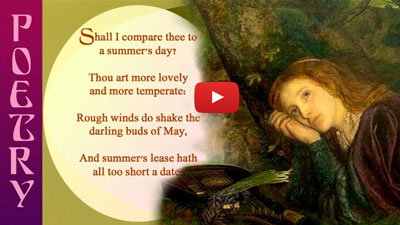Shall I compare thee to a summer’s day?
Transcript - Shakespeare's Sonnet 18
Shall I compare thee to a summer’s day?
Thou art more lovely and more temperate:
Rough winds do shake the darling buds of May,
And summer’s lease hath all too short a date:
Sometime too hot the eye of heaven shines,
And often is his gold complexion dimm’d;
And every fair from fair sometime declines,
By chance, or nature’s changing course untrimm’d;
But thy eternal summer shall not fade,
Nor lose possession of that fair thou ow’st;
Nor shall Death brag thou wander’st in his shade,
When in eternal lines to time thou grow’st:
So long as men can breathe or eyes can see,
So long lives this, and this gives life to thee.
Thou art more lovely and more temperate:
Rough winds do shake the darling buds of May,
And summer’s lease hath all too short a date:
Sometime too hot the eye of heaven shines,
And often is his gold complexion dimm’d;
And every fair from fair sometime declines,
By chance, or nature’s changing course untrimm’d;
But thy eternal summer shall not fade,
Nor lose possession of that fair thou ow’st;
Nor shall Death brag thou wander’st in his shade,
When in eternal lines to time thou grow’st:
So long as men can breathe or eyes can see,
So long lives this, and this gives life to thee.
Sonnet 18 - insights, themes and interpretation
● Shakespeare’s sonnet 18 is one of the best know of his poems, first published in 1609 - though most likely written some years earlier.
● With the famous opening lines ‘Shall I compare thee …’ the narrator wonders if the beauty of his beloved could be measured alongside something as splendid as a fine summer’s day.
● He considers the possibility that the object of his devotion might not only be its equal (the summer's day) but better. After all, the harsh winds can blast the buds on the trees and flowers, and the sun can sometimes be too hot, or its brightness dimmed. No matter how fair the day or season, there is always an inevitable decline in its charms. The ‘lease’ of summer is also often short – declining into autumn.
● His beloved, however, is more ‘temperate’ - more calm and pleasing than ‘nature’s changing course untrimm’d’ – (untrimmed being a reference to the sails of a boat, the vessel being at the mercy of the wind when not aligned properly).
● The message here is that ideas and thoughts can sometimes prove more enduring than those physical things we sometimes mistakenly perceive as reality. The so-called reality passes with time, but the ideas and memories that it inspired can remain.
● With amazing self-confidence, the poet reflects on the permanence of his work (his eternal lines), and so even as the physical beauty of his beloved fades with the passage of time, the thought of it will grow and remain forever lovely through the vehicle of his poem – something which he presumes will be read ‘as long as men can breathe or eyes can see.’ He was right, of course. But how did he know?
● With the famous opening lines ‘Shall I compare thee …’ the narrator wonders if the beauty of his beloved could be measured alongside something as splendid as a fine summer’s day.
● He considers the possibility that the object of his devotion might not only be its equal (the summer's day) but better. After all, the harsh winds can blast the buds on the trees and flowers, and the sun can sometimes be too hot, or its brightness dimmed. No matter how fair the day or season, there is always an inevitable decline in its charms. The ‘lease’ of summer is also often short – declining into autumn.
● His beloved, however, is more ‘temperate’ - more calm and pleasing than ‘nature’s changing course untrimm’d’ – (untrimmed being a reference to the sails of a boat, the vessel being at the mercy of the wind when not aligned properly).
● The message here is that ideas and thoughts can sometimes prove more enduring than those physical things we sometimes mistakenly perceive as reality. The so-called reality passes with time, but the ideas and memories that it inspired can remain.
● With amazing self-confidence, the poet reflects on the permanence of his work (his eternal lines), and so even as the physical beauty of his beloved fades with the passage of time, the thought of it will grow and remain forever lovely through the vehicle of his poem – something which he presumes will be read ‘as long as men can breathe or eyes can see.’ He was right, of course. But how did he know?
Technical info’
Type of Poem =
Shakespearean Sonnets have 14 lines in which a particular theme or idea develops and alters - often reaching an unexpected or thought-provoking conclusion.Rhyme Scheme =
ABAB CDCD EFEF GGMeter =
iambic pentameter (made up of 5 stressed and 5 unstressed syllables on each line).Fictional Memoir
Classic Poetry
Historical Novel
Georgian novel













